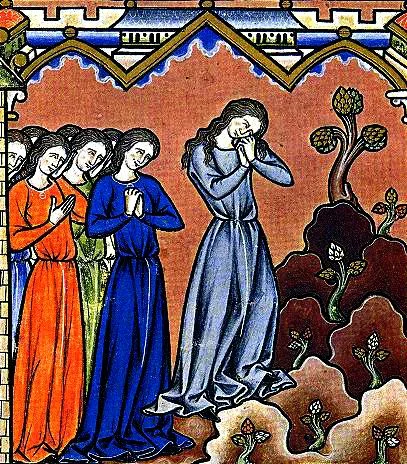What can we say about her? For her?
Another product of the book of Judges. Another woman terrorized by a system of patriarchal rule and a decided lack of forethought. Another woman killed "when there was no king in Israel and everyone did what was right in their own eyes." She doesn't even have a name, save that of her killer: her loving father, who she greets with joyful dancing. Who meets her with death.
She saw it coming.
She didn't cower, didn't beg. She didn't ask her father what sort of man makes such a thoughtless vow; what sort of warrior would risk death for countrymen who despised him, but is unwilling to lay down his life for his only child were God to demand it — if God were in the business of requiring payment for words He never asked for. She bravely accepted her fate, made her father feel comfortable with his crime. She merely asked for time, two months, before the sentence of death was carried out.
Two months.
Time for her father to change his mind; Time for her to run away (as Jephthah might have secretly wished); Time for the clouds to part and a voice from heaven declare, "this is not my will," or an angel to appear with an ewe caught in a hedge, staying Jephthah's hand. Two months passed and then so did she.
In a time without kings, when every man did what was right in his own eyes, a father killed his daughter and the heavens were silent. Or were they? Jephthah, the son of a prostitute, a bastard thrown away by his father's house (Judges 11:1-3), ended his own line: he had no other children (11:34b), his daughter gave him no heir (11:39).
Perhaps this is part of his punishment: a man who knew the value of family, destroyed the happiness he had; a man unable to treasure the gift in hand, lost it.
Perhaps God speaks through natural consequences.
Not that this brings her back from the dead, or tell us her name.
But what do we know: we made this game and you probably think we're going to hell.

